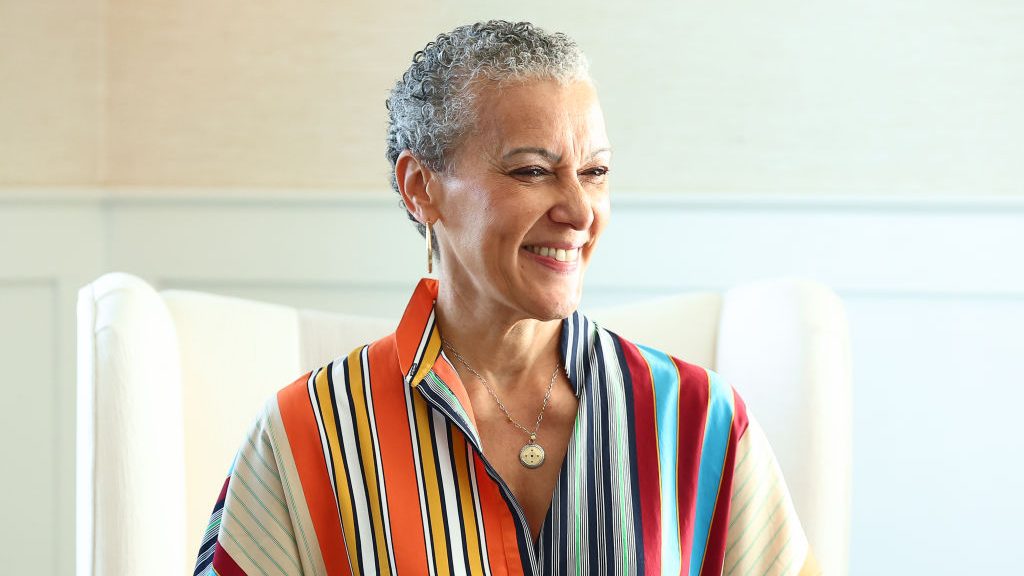We bring news that matters to your inbox, to help you stay informed and entertained.
Terms of Use and Privacy Policy Agreement
WELCOME TO THE FAMILY! Please check your email for confirmation from us.
Health
The OB/GYN and certified menopause practitioner is getting real about aging and women’s health in her latest release.
What is the right age to start learning about menopause and women’s aging health? Mid-30s? Early 40s? Mid-40s? According to Dr. Sharon Malone, it’s never too soon for “grown woman talk.”
The Washington, D.C.-based OB/GYN and certified menopause practitioner has just released a book titled “Grown Woman Talk,” which she hopes will get the conversation started around women’s health as they grow older, no matter their age or gender.
“Even though it may not be relevant for you at this particular juncture in your life, there are things and information that might be useful for you,” Malone told theGrio during a recent interview. She added, “There’s an entry point in my book for everyone.”
The book, which includes a foreword by former First Lady Michelle Obama, iconic soul song names as chapter titles, and health advice interspersed with personal anecdotes, focuses on outlining menopause and preventive expert health advice for women and those who will experience menopause — a phase that naturally occurs when the body’s reproductive hormones begin to decline with age.
Despite nearly all women experiencing menopause starting in their late 40s to early 50s (with it beginning up to a decade before for Black women), there is still much that many do not understand about the inevitable life phase. Malone’s book seeks to inform and arm readers with the arsenal to manage their health better as they grow older.
“Here’s the thing about growing older,” Malone said, adding, “It doesn’t necessarily mean that there’s something terrible at the other end of that spectrum. I’m telling you how to make sure that it’s good at the other end of the spectrum.”
Through her line of work and personal experience, Malone has observed that many individuals seemingly stop discussing and thinking about their reproductive health after a certain age.
“As women get to midlife, we feel like we’re pretty well covered,” she said. “When we’re younger, we’re talking about contraception or fertility or pregnancy, then you get to be about 40, and you fall off a cliff.”
Outside of hot flashes, weight gain, and an altered sex drive, Malone said when it comes to discussing menopause with others, “I think it’s a matter of just understanding what we even mean by it.”
“The big change,” as many refer to menopause, comes in three stages: perimenopause, menopause, and postmenopause. Malone explained that most of the symptoms many think of as being associated with menopause, including those notorious hot flashes, occur during the perimenopausal phase, with menopause beginning when you have your last period and never really quite seeming to end.
“Menopause is forever,” Malone noted.
In addition to wanting to inform the masses about what to expect from their health as they get older, Malone said she wrote her book because she wanted to prepare people to take the best care of themselves in a world with an evolving health care system.
“Medicine has changed and will continue to change and not necessarily in a good direction. It is becoming less personal. It is becoming less efficient for you as the patient,” she said. “The locus of control, I should say, has shifted from the doctor to you. And that’s an opportunity. Don’t think of that as always something bad. But, you know, as I say, no one’s really coming to save you.”
With an aging population, a changing health care system, and the everyday ebbs and flows of life, Malone said women’s health isn’t just understanding and managing menopause. It’s also thinking seriously about how outside pressures like stress can factor immensely into your health as you age. Among the personal stories Malone shares in “Grown Woman Talk,” she said she tells the story of her late sister Vivian Malone Jones, who was among the first Black students who integrated the University of Alabama in 1963. Jones died in 2005 in her mid-60s, which Malone, now in her early 60s, realizes is a relatively early age to die. Malone suspects her older sister’s life was cut short by the stress and toxic environment she was forced to live through in a Jim Crow-era South.
TheGrio Lifestyle
TheGrio Lifestyle
TheGrio Lifestyle
TheGrio Lifestyle
Kayla Grant
TheGrio Lifestyle
TheGrio Lifestyle
TheGrio Lifestyle
“I want women to understand what stress and what a stressful life does to you,” she said. “It’s not just acute stress; it’s chronic stress. And that is something that seems to be almost endemic with Black women. We deal with a lot of stress, be it personal stress, financial stress, you know, stress at work, and we’re just not built for that.”
All in all, Malone hopes “Grown Woman Talk” can be a kickstarter for intergeneration conversations. Having grown up in the South, Malone recalls women never speaking openly with younger generations about their health. They would often dismiss younger women by saying they were discussing “grown folks” business.
“You need to know what your mother’s pregnancies were like; you need to know her perimenopause and menopause,” she explained. “As long as you at least have a good generation or two, then it helps you avoid the pitfalls ahead of you.”
Kay Wicker is a lifestyle writer for theGrio covering health, wellness, travel, beauty, fashion, and the myriad ways Black people live and enjoy their lives. She has previously created content for magazines, newspapers, and digital brands.
STREAM FREE
MOVIES, LIFESTYLE
AND NEWS CONTENT
ON OUR NEW APP

